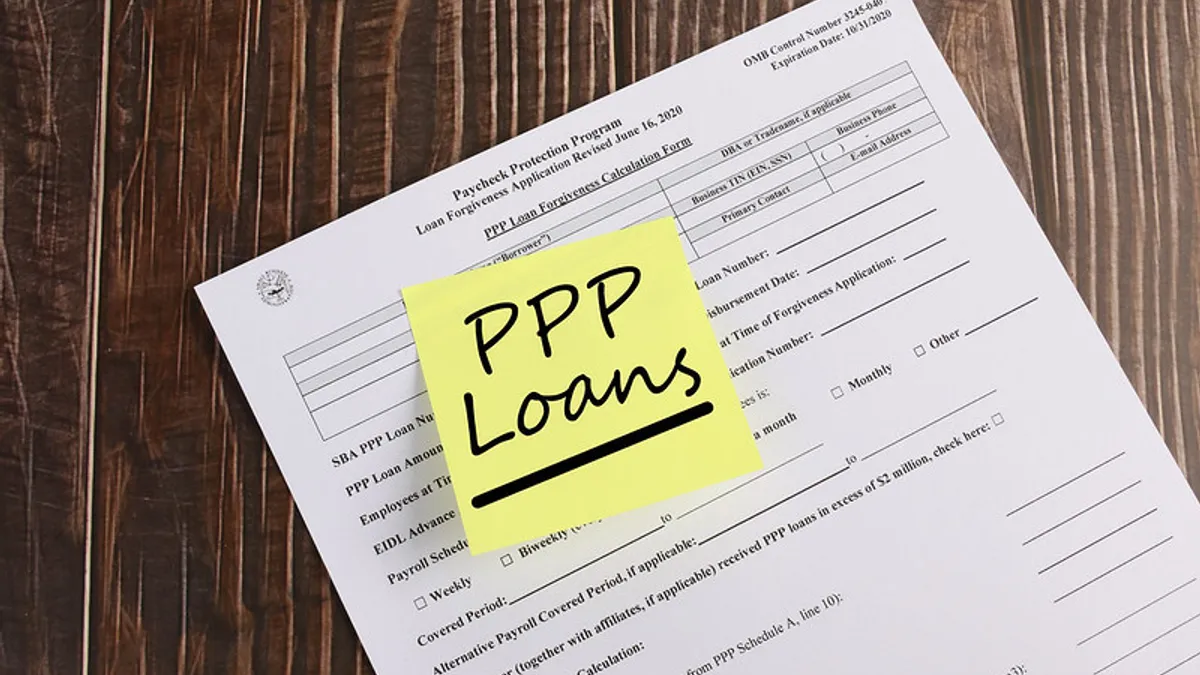Dive Brief:
- Small-business loan servicer KServicing filed for bankruptcy Tuesday amid allegations it was too lax in its issuing of government-backed COVID-19 relief loans, according to court documents.
- The firm, formerly known as Kabbage, processed more than $7 billion worth of Paycheck Protection Program (PPP) loans before the company’s technology and a portion of its team were acquired by American Express in 2020, leaving behind the holding company, KServicing, to administer the remaining $1.3 billion portfolio of COVID relief loans.
- KServicing is using the bankruptcy process to obtain a reprieve from having to constantly defend against several federal and state investigations into its handling of the loans, Deborah Rieger-Paganis, the company’s restructuring adviser, wrote in KServicing’s bankruptcy filing.
Dive Insight:
In the pandemic, KServicing delivered more than $7 billion in PPP loans to more than 300,000 borrowers, making it the second-largest PPP lender in the nation by application volume, the company noted in its bankruptcy filing.
The company, which is in the process of winding down its operations, is “overburdened” by a number of disputes regarding its lending practices, requiring the firm to expend significant time and resources defending itself across “multiple costly fronts,” the filing claims.
The firm’s lending practices are under investigation by the House Select Subcommittee on the Coronavirus Crisis, the Federal Trade Commission and the Small Business Administration, according to court documents. Justice Department offices in Massachusetts and the Eastern District of Texas are also investigating claims the firm lacked proper fraud controls in its servicing of PPP loans.
The ongoing investigations into alleged PPP errors, which the company said it “vigorously disputes,” have delayed the forgiveness process for some loans, Rieger-Paganis wrote.
“The hindsight investigations and misdirected scrutiny severely hamper the Company’s ability to accomplish its mission of servicing the balance of the PPP Loans in its Loan Portfolio and have caused significant additional costs to winding down its business,” she wrote.
KServicing had the lowest rate of borrower forgiveness of any major lender in the program, according to a Miami Herald investigation.
The firm blames American Express for some of its forgiveness delays, claiming the payments company failed to follow through with promised PPP documentation and forgiveness support after the acquisition.
American Express acquired a substantial majority of KServicing’s business for approximately $750 million, a transaction that specifically excluded a small portfolio of legacy loans and the firm’s PPP business, KServicing said in the court filing.
KServicing said AmEx’s lack of cooperation following the transaction forced the firm to turn to a third-party vendor, Biz2Credit, to process loan forgiveness applications.
AmEx disputed KServicing’s claims, telling the Miami Herald it “has honored its obligations under the transition services agreement and will continue to do so in accordance with its terms.”
During the pandemic, fintechs like Kabbage were praised for their expediency and willingness to serve businesses that were unable to secure loans from traditional lenders. Fintech PPP lenders, however, were almost five times more likely to be linked to suspicious PPP loans than traditional banks, according to a 2021 study by researchers at the University of Texas, Austin.
KServicing said it processed PPP loan applications “in good faith” as quickly as possible despite changing guidance and a lack of clarity from the SBA during the PPP’s initial rollout, Rieger-Paganis wrote.
“Despite this lack of clarity, government officials publicly expressed to participating lenders that time was of the essence with regards to administering loans, at times even asking lenders to process loans to eligible PPP Borrowers on the same day that they applied,” she wrote. “There was no other way to objectively view those facts and circumstances — it was a national emergency.”














